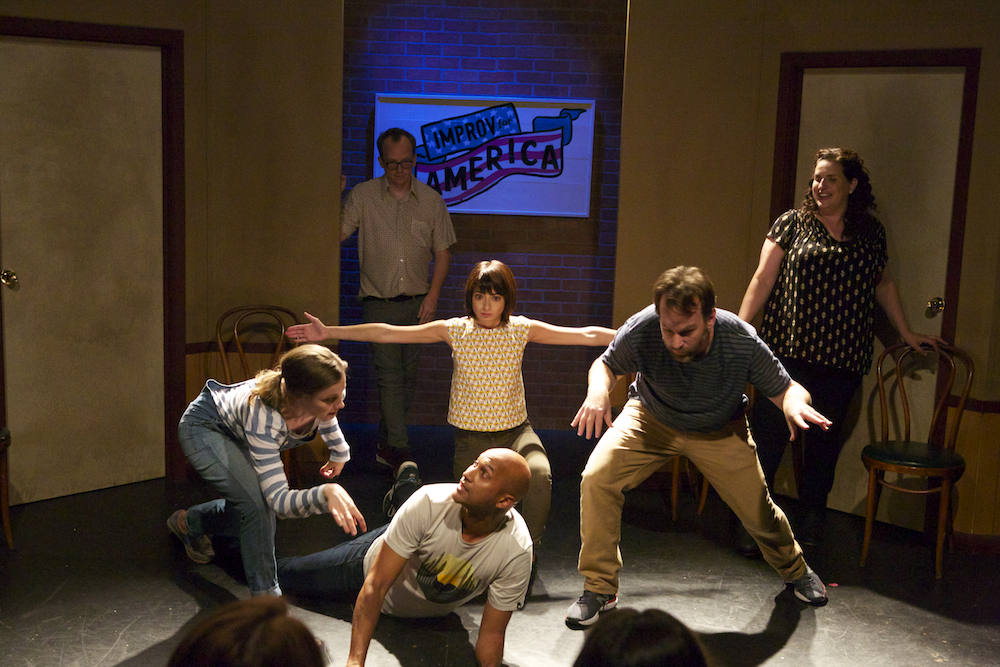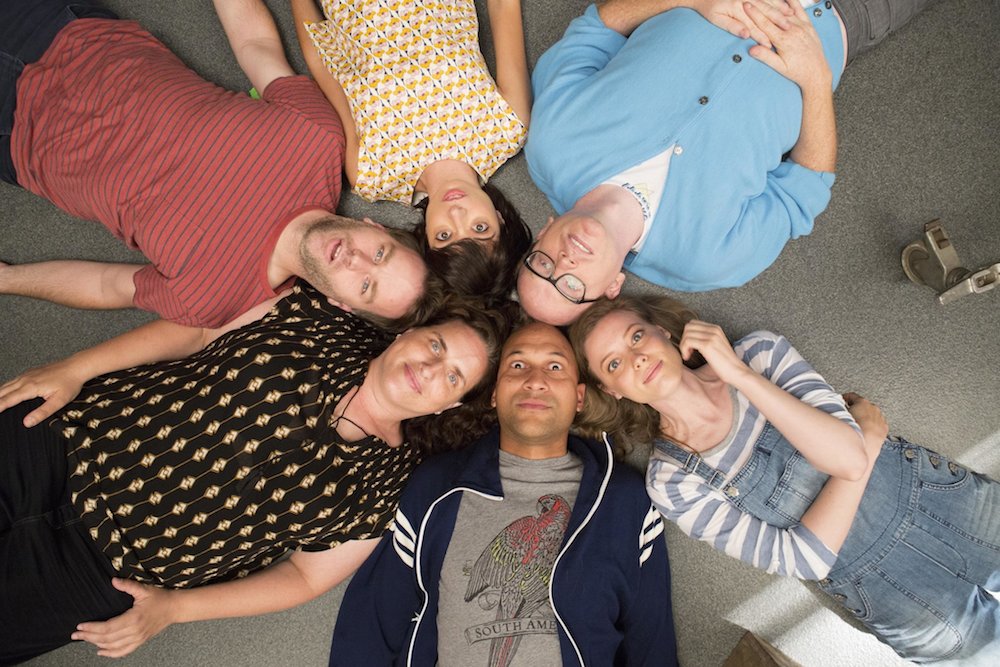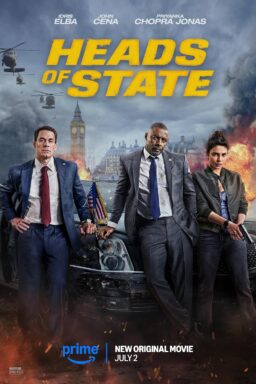Mike Birbiglia’s “Don't Think Twice” is the wisest film about hustling artists since the Coen brothers’ “Inside Llewyn Davis.” Its poetry is in the very personal, as comedian-turned-writer/director Birbiglia carefully crafts a character piece about members of a struggling NYC improv group, all trying to make it big. They support each other on and off the stage like a family, but are individually at odds with success, as the notion of failure looms over them each time someone else gets an audition for the “Saturday Night Live”-esque show “Weekend Live.” Birbiglia co-stars in the movie as a mid-30s improv teacher named Miles who is worried that his time to succeed has passed; the other members of his “Improv for America” team are played by Keegan-Michael Key, Gillian Jacobs, Kate Micucci, Chris Gethard and Tami Sagher.
2012’s “Sleepwalk with Me” was Birbiglia’s debut as a director (co-directed with Seth Barrish). Based on his solo show of the same name, it hit brutally honest checkpoints about being in a dwindling long-term relationship while trying to achieve personal success as a stand-up comedian. (Roger gave the film three-and-a-half stars, calling it “surprisingly successful.”) Since then he’s composed other solo shows including “My Girlfriend’s Boyfriend” (released on Netflix) and the recent “Thank God for Jokes,” and has acted in films like “Trainwreck,” “Digging for Fire” and the series “Orange is the New Black.”
Birbiglia sat down with RogerEbert.com inside one of the city’s improv studios to discuss his new film, how he enlisted Nicole Holofcener and Greta Gerwig to help with his script, a true story of dark humor at a Benihana that didn’t make into the final draft and more.
Thanks for talking with us today, Mike.
I have a Roger Ebert-signed, framed review of “Sleepwalk with Me” on my wall. It was so meaningful to me.
Do you remember the first time you saw that review? Where you were, what you felt?
I remember his assistant brought it to the theater. She brought it to [producer] Ira Glass to give to me, and he was like, “I have something for you.” And it was just a … I’ve looked at it a lot. It’s just a reminder of where I’ve come from. Because when I first saw Roger when I was on TV as a kid, talking about movies and talking about them in a way that they were important, and we’re taught in culture that they’re not important, and so he’s teaching us they are important, that’s the first time I started to register that. So when he starts to say, “This is important,” it gives some sense of affirmation that I’m on the right path.
At this point in your career, where is directing in terms of priorities for you?
I think the highest. Somewhere between stand-up and filmmaking, or solo shows I should say, and film. I think at a certain point you have to ask yourself, “What do you have to contribute to the world?” And it’s taken me a long time [laughs], it takes a lot of trial and errors to figure that out. But I think if I could narrow it down, I’d say what I have to contribute is that I create things. And the hope is that they’re emotional, and that they’re from the heart, and that they have humor. And that’s all I got.
“Sleepwalk with Me” feels more personal, but “Don’t Think Twice” seems to be more about the audience.
They’re both about the audience. At its best, anything is about the audience. It’s like, whenever I work on these one-person shows, “Thank God for Jokes,” “My Girlfriend’s Boyfriend,” “Sleepwalk with Me,” my director and I always spend these hours and hours talking about “How is this about the audience? What is this, how does the audience see themselves in this story?” With “Sleepwalk with Me,” that’s obviously autobiographical, this is the first thing I’ve done that’s fictional, but it’s oddly maybe more personal than “Sleepwalk with Me.”
How so?
I didn’t expect that to happen, but I think you can put more on the page when it’s not you. You can put more embarrassing shit you’ve seen and witnessed and experienced, because no one is going, “You did that?” And I say, “Well, someone did.” I always try to write something that I’ve witnessed, experienced, heard about or read about, you know what I mean? That’s sort of my qualification for what goes on the page. And so, in some weird way, by becoming an amalgam of what I’ve lived and taken in and experienced and heard about, it gives you more options because it’s not autobiographical, to push the envelope a little further, and be in some ways more revealing.
Are you scattered in these characters?
Sure, yeah. It’s like, I want to be Sam (Gillian Jacobs), I aspire to be Sam. But in some ways I’m more like Jack (Keegan-Michael Key), and then on my worst days I have the bitterness of Miles (Birbiglia).
Where do you find that balance between originality and truth? You’re making a movie that still has to be fresh, but recognizable.
I think you kind of lean into the conflict, I think that that’s where you can start to hook people in. And you also … I did a series of like 10 or 12 readings at my house, where actors and writers would come over, and we’d read the script out loud and have pizza afterwards. And I would always say that the script might be terrible, but the pizza’s phenomenal, and I’d get really good pizza. I would sort of open up the idea that I don’t want compliments on the script. I don’t want people to say, “I love it!” I want to hear the toughest criticism.
Was it like a preliminary editing process?
It was almost like its own self-created studio development process, without a studio. It was just me.

Were people keeping you in check?
Yeah, and there were people like Phil Lord, was there. Nicole Holofcener, Ira Glass would come to a lot of them, Brian Koppelman, Craig Mazin, a lot of really good … Greta Gerwig came along. Heavy hitters, people who would charge like, $200,000 a day to do that and I gave them pizza.
What was the pizza place?
Lucali or Luzzo’s, or OTTO Enoteca Pizzeria. Lucali, you can’t get a table, it’s like two hours to get a table, and it’s cash only. But, maybe if I plug it enough in interviews they’ll start to pay attention that I’m throwing them business.
With this movie and “Sleepwalk with Me,” there is an overriding good spirit; these movies are about struggling artists, but your characters aren’t mean spirited. Where does that come from?
I think from my mom, and my dad is really heady. He’s a doctor, and my mom is a nurse, and she’s really warm and sweet and Irish Catholic and kind and generous, from Buffalo, NY. I will say that, the characters are also rough around the edges. But I wrote this thing on my wall when I was writing the film, I wrote, “art is socialism but life is capitalism.” That was this guiding principle that I had which is like, no one ever says it because it’s too on the nose, but I thought an interesting idea for a movie. This idea that, when we gather together, we can embrace socialist ideas, like we’re all equal, we’re all in it as a group, and we’re all in it together and going to help each other. And then when push comes to shove, people really look out for themselves. So I think that there’s a duality of people, and I think that when Ben Stiller read the script as a favor at one point, before he was involved at all, he said “My favorite thing is that there are no villains.” And that’s really what the point is. Honestly, that’s what I miss in studio films now. And I wish [sighs] … and there’s great studio films. I sometimes lay into studio films so hard that I forget the fact that there’s “Guardians of the Galaxy” and there’s “The Lego Movie” and then there’s “21 Jump Street,” there’s definitely some great studio films, if they make it through. But a majority of them are kind of, I find, kind of insulting to our intelligence. They have the good guy, the bad guy, and it’s just easily understandable, to a point of, I think, being kind of boring. So it’s somehow become the role of the independent filmmaker to make films that have shades of gray in them.
Do you feel there are antagonistic qualities to big movies nowadays? Not just about being violent, but pushing people’s buttons?
Yeah, I think so. There’s a degree to which comedies have to be shocking in order to get people’s attention. “You gotta see this scene where they shit in a bag!” My movies are never going to have that.
It’s possible you might be making independent films for a bit longer, what with the current scene as it is.
[Laughs] Oh, yeah. But am I going to be stuck in independent film? It’s more like, will I be lucky to be in independent film? I don’t know. I definitely want to stay in the world of my final cut, I don’t want to give that up. So, I don’t anticipate my next movie costing $40 million. Because I think that’s what you give up.
Would you be interested in trying to navigate larger scale productions?
I’m open to it, but I’m a little baffled by what the upshot of it is. People say the studio is the bank [laughs], and they’re an amazing advertising agency and distributor, and they get it out to zillions of people. But increasingly, with the internet, it’s like, “Well, I can get my little movie out to millions of people. Do I need zillions? Or am I comfortable with millions?” I don’t know if I crave that. I also feel like if the movie is good enough, I feel like we’re in an era where people will find it.

Especially if you have the kind of stars that you have in your movie.
Yeah, who kind of weren’t stars when we cast them, and have become them.
That’s some exciting luck for you.
It’s phenomenal. I mean, Keegan was a star but he was a TV star, and now he’s a movie star, which is a different animal. And Gillian was a TV star also, and is on the verge of becoming a movie star in my opinion.
In this film, there’s a great statement about dark humor, like when characters are trying to make each other laugh immediately after a funeral. What is the darkest example of this from your own life that you’re willing to share?
Well, that was based on my friend Ptolemy, and my friend’s dad. And we had that running joke … there’s something in that real life story that was too dark for the movie. I had it in drafts, and it was just too weird. Which is that after his dad passed away, we went to Benihana to commemorate his life, a bunch of us, and we had his ashes there. And at one point, Ptolemy, I think had been drinking a little bit, and sprinkled some of the ashes onto the grill and the chef didn’t notice and then he just chopped it into whatever he was cooking. So we ate a little bit of Ptolemy’s dad. But it’s almost too weird of a thing to happen in a movie without the audience ebbing like, “Are they cannibals?” I think that tips it too far.
The tone would have gone in a completely different direction, for one.
And there’s a lot of discussion with jokes these days, and I have a whole show about it, “Thank God for Jokes.” I will say that I feel strongly that jokes are a coping mechanism for dealing with darker topics. People say, “You can’t joke about the Holocaust, you can’t joke about this.” And I always feel like bringing those topics out of the shadows is actually beneficial, because otherwise I don’t think we’d talk about those things as much. Who wants to talk about the Holocaust? And so there’s a degree to which, it’s like those topics want to stay in the shadows, they desperately want to be ignored, and by joking about them, we’re bringing them out. But I also feel like there’s, and then it becomes this issue of, “Well, I don’t like that joke about the Holocaust, it’s offensive to me,” and it’s like, “Well, that’s a casualty of the fact that we’re open to joking about anything. There’s going to be some bad ones, there are going to be some good ones.” But overall, I think there’s more good than bad.
Is there some timing that needs to be kept in mind? Could you make a joke at a funeral?
Timing is so case-specific, because it depends on the audience. If the audience is you and your four friends, I think you can make a joke five minutes after the tragedy happened. I think that if you have a national television show, you might need to wait a few weeks or a year, or a couple of years.
What was important to you to express about the idea that some people don’t make it, and that’s OK?
I think that there’s a false sense of what success means in this country. I think there’s this sense that success equals visibility and exposure. People love it. And it’s like, not what I think success should be, but that you’re doing a service to other people, and you are connecting with other people. It’s unfortunate that that’s lost. I think that’s the thing that I’ve started to understand in my 30s. In my 20s, I was just chasing any morsel of success in any form. I would have taken any commercial or TV part or movie, anything. And now in my 30s, I’m starting to realize that you only have so much time on Earth. So it’s like, what are you gonna do?












